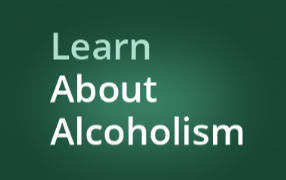Alcoholism Signs and Symptoms
You notice a change in your spouse’s behavior, but you probably didn’t believe it was alcoholism signs and symptoms. At first, you think he or she is just stressed out from work and the kids’ activities — maybe even a little moody from time to time.But when these changes persist and become more severe, you start to suspect that something else might be going on: alcoholism.
Maybe you’ve seen signs of this before, but never thought it was serious enough for concern. If so, you may have been overlooking the alcoholism signs and symptoms that should never be ignored.

Recognizing Problem Drinking: Alcoholism Signs and Symptoms
In many cases, if you find yourself wondering if your drinking is a problem, it is. If you are worried about a loved one, you may recognize the consequences of their drinking behaviors before they do.
An important differentiation to make would be that of alcohol abuse from alcohol dependence. Both can be concerning, however there would be different approaches would be used for treatment.
Alcoholism is viewed as a disease in the majority of the medical field. As such, there are certain characteristics that are associated with a diagnosis. Understanding and recognizing these characteristics can help you understand your struggle or the person you are concerned about.
Signs of alcoholism, or problem drinking in general, are not always easy to spot. In order to accurately determine if a person may have a problem with alcohol, all the pertinent facts need to be properly assessed by a professional.The “facts” include:
- The person’s age;
- whether the drinking is occurring on a regular basis;
- any past treatment for substance abuse problems;
- family history (including other addictions);
- emotional state and mental health issues (depression or anxiety);
- physical state (sleep disturbances, tremors or other nervous system disorders), as well as how often and how much alcohol is consumed during bingeing episodes.
Sometimes there isn’t one event that stands out as a definite sign of alcoholism, but rather a combination of factors that creates concern.
For more on the disease concept of addiction, follow the link.
Alcohol Use Disorder Diagnostic Criteria
The prevalence, accessibility and social acceptance of alcohol make it one of society’s most widespread and costly addictions. Recognizing the signs of alcoholism can be the first step in getting help.
For the majority of people, regular social drinking doesn’t lead to imminent abuse or dependence. Yet, there are millions of individuals around the globe who have a physical dependence or addiction to alcohol.
They continue to drink in the face of severe consequences to their careers, well-being and relationships. This is one of the signs of alcoholism.
What causes a person to become an alcoholic? Research suggests genetics and family history create a predisposition to the disease. There are also factors that increase vulnerably such as the existence of an alcoholic parent, childhood conduct disorder, anti-social behavior, or a transforming life event.
Even where a person resides and the area’s cultural views on alcohol can play a role in the onset of the disease.
Alcohol abuse or dependence may not be readily apparent — or even a concern — to someone with a drinking problem. However, recognizing alcoholism signs and symptoms is a critical first step in fighting the disease.

Quick Screen Tool: CAGE Test
The CAGE test is an assessment tool to aid clinicians and others in identifying alcoholism signs. It is one of hundreds of tools used to screen individuals and determine treatment options.
Many of these tools are available in the National Institute on Alcohol Abuse and Alcoholism (NIAAA) guide, Assessing Alcohol Problems: A Guide for Clinicians and Researchers, which can be accessed online.
The CAGE test is comprised of four brief questions designed to detect alcohol abuse or dependence. Answering yes to any CAGE question suggests a possible alcohol problem.
Answering yes to two or more questions indicates a high risk of alcohol abuse or dependence. Note that CAGE questions are only guidelines – not diagnostic criteria.
CAGE Test Questions:
- Have you ever felt the need to Cut down on alcohol consumption?
- Are you Annoyed when people question your drinking habits?
- Do you feel Guilty about your alcohol use?
- Have you ever used alcohol as an Eye opener to recover from a hangover?
Alcoholism Signs and Symptoms
Some signs of alcoholism include:
Cravings: Drinking may become an irresistible need and fill almost every thought throughout the drinker’s day.
Loss of Control: The alcoholic may be unable to control the driving compulsion to drink.
Physical Dependence: The body and brain of an alcoholic become dependent on the drug’s effect. Without a drink, the alcoholic may experience withdrawal symptoms such as anxiety, irritability, nausea, and tremors. In severe cases, seizures may result.
Increasing Tolerance: Over time, the alcoholic will need more and more alcohol to achieve the same results.
Appearance Changes: Poor dental hygiene, blotchy skin, foul smell, receding hairline from alcoholism. Poor nutrition can result in many health issues.
Alcohol Abuse vs. Dependence
Those who abuse alcohol but have not yet become addicted or dependent have excessive drinking patterns but do not have the alcoholism signs described above. Alcohol abusers don’t experience uncontrollable drinking, craving, physical dependence and tolerance, while alcohol-dependent individuals may experience many of these signs of alcoholism.
Abuse of alcohol over a twelve-month period often results in one or more of the following:
- Problems meeting responsibilities at home, work, and/or school.
- Risky behavior while drinking, such as drunk driving.
- Legal problems that occur due to drinking, such as DWI (driving under the influence).
- They continue to drink in spite of the negative effects of alcohol on work, health, and family.
Other signs of alcoholism include:
- Drinking alcohol to relax, relive stress, or get to sleep.
- Drinking in order to socialize.
- Hiding alcohol or empty bottles and/or lying about consumption.
- Not able to recall events that occurred while under the influence.
- Unable to quit drinking.
- Worry about alcohol running out during a weekend or holiday.

I am a Mental Health Counselor who is licensed in both New York (LMHC) and North Carolina (LCMHC). I have been working in the Mental Health field since 2015. I have worked in a residential setting, an outpatient program and an inpatient addictions program. I began working in Long Island, NY and then in Guelph, Ontario after moving to Canada. I have since settled in North Carolina. I have experience working with various stages of addiction, depression, anxiety, mood disorders, trauma, stages of life concerns and relationship concerns.
I tend to use a person-centered approach which simply means that I meet you where you are and work collaboratively to help you identify and work towards accomplishing goals. I will often pull from CBT when appropriate. I do encourage use of mindfulness and meditation and practice these skills in my own life. I believe in treating everyone with respect, sensitivity and compassion.
I recognize that reaching out for help is hard and commend you for taking the first step. We have professionals available who would be happy to help you move closer to reaching your goals related to your drinking concerns. You may reach these professionals by calling 877-322-2694.
